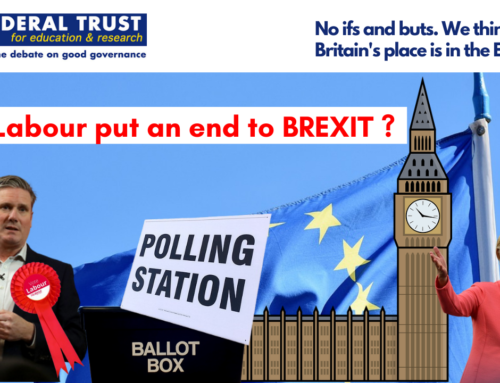
Photo credit: Steve Nimmons / CC BY
There is a celebrated passage in Marcel Proust’s “Sodom and Gomorrah” where the narrator sums up the nature of a character, Charles Morel, who in some sense encapsulates all that is vile in the values of his milieu. Morel, we are told, “would not shrink from any act of servility if the need arose, and is utterly incapable of gratitude.” It is impossible not to be reminded of this by the current conduct of many Conservative MPs towards their leader, the Prime Minister.
Conservative criticism of Johnson
The fact is: Mr Johnson has become an embarrassment to most Conservative MPs. His mismanagement of the COVID crisis has apparently finally opened their eyes to his clear unsuitability for the office which he holds. In their closed councils he is now regularly and resoundingly condemned as undisciplined, exhausted, evasive of unpalatable truths with bluster or outright deception and motivated only by short-term presentational considerations calculated to promote or preserve his personal position. All whilst people die and the economy collapses. Some of his critics go so far as to suggest that once “Brexit is done at the end of this year”, the party should prepare to replace him with someone more suitable: someone cleverer, more conscientious, more competent, more consistent, even (a bold thought this) more Conservative.
All of which constitutes an astonishing demonstration of ingratitude. For those same Conservative MPs, most of whom supported leaving the European Union in the 2016 referendum, and all of whom fully endorse doing so now, owe an enormous debt to Mr Johnson. It is most unlikely that the referendum would have been won by the advocates of Brexit, and that result confirmed by the clear Conservative general election victory last year, without the singularly melodramatic style of his leadership, and the singularly mendacious substance of his campaigning. He is Brexit’s great enabler. The vast majority of his critics today were all too willing to follow his lead then, and to celebrate those triumphs. The contemporary Conservative Party is his creation. And post-Brexit Britain will be his creation too.
Will Johnson survive?
So although one might suppose there could be few easier tasks than finding a better Prime Minister than Mr Johnson, such a palace coup is most unlikely. His attachment to the office he has sought since childhood will certainly not be diminished by illness, and may even be reinforced by it. He has created, or rather had created for him, a formidable centralised apparatus of control, one which delivers punishments and rewards far more efficiently and intensely than any recent whips office, since it operates as much indirectly through business and the media as it does directly within Parliament. At the centre of this system is the much-publicised Dominic Cummings, a man who seems to see demonstrating daily his disdain for Conservative MPs as not merely a duty but a pleasure.
Above all, Mr Johnson has no real rivals. Mr Gove might be recognised as having some technical competence, but he is assuredly also recognised as having no popular appeal, whilst Mr Sunak’s present recognition as having both seems unlikely to survive the reality of paying for the economic crisis the combination of Brexit and COVID entails. Mr Raab is recognised for neither. And certainly no less hard-line Brexiteer, such as Mr Hunt, would be capable of claiming the crown. Because Brexit is the only defining purpose of this government, however much its efforts are occasionally distracted by the imperative of combatting COVID, or by its supposed desire to “level up” the Nation, or its sporadic ambition to reform the UK’s governance.
Johnson is Brexit and Brexit is Johnson
Mr. Johnson’s Conservative opponents are also operating under a further, crippling delusion. They appear to believe that, at some point in the foreseeable future, Brexit will be “done”. Mr Johnson indeed may once have shared this illusion himself. But now surely he knows this cannot be the case. His Party can never meet this country’s evident general need to manage rationally and amicably its ongoing relationship with so proximate and powerful a neighbour as the EU. His Party’s specific need is rather to ensure that the relationship between the UK and EU remains confrontational, and that such confrontation continues to be reflected within Britain. Continuity Brexit, with its unending portrayal of the Europeans as the “enemy without” and the “Remainer/Remoaner elite” as the “enemy within”, has become essential to keeping the Johnson government coherent and him in Number 10. It is this realisation which makes a de facto “no deal” failure the overwhelmingly likely eventual outcome to the negotiations supposedly seeking a sustainable and stable Free Trade Agreement with the EU.
Although he is unlikely to do so, Mr. Johnson would be justified in accusing his critics of “playing the man, not the ball.” His critics sometimes see the mote in the Prime Ministerial eye, but not the beam in their own. The Prime Minister’s failings are not simply personal deficiencies. In a manner reminiscent of Proust’s Charles Morel, they in some sense encapsulate all that is wrong about Brexit itself: its deception and self-deception, its frivolity and fantasy, its lack of strategy and reckless disregard of consequences. Of course, chained to Brexit as they are, the Conservative MPs swept to power by Boris Johnson cannot possibly admit this even to themselves as a group, and much less to the British public. To do so would bring with it the utter destruction of Conservatism. Nevertheless some, in their exasperation with Mr Johnson, may be just beginning privately to recognise the simple truth: the project is as flawed as its great enabler. That, in itself, constitutes a critical turning point in favour of pro-Europeans.




